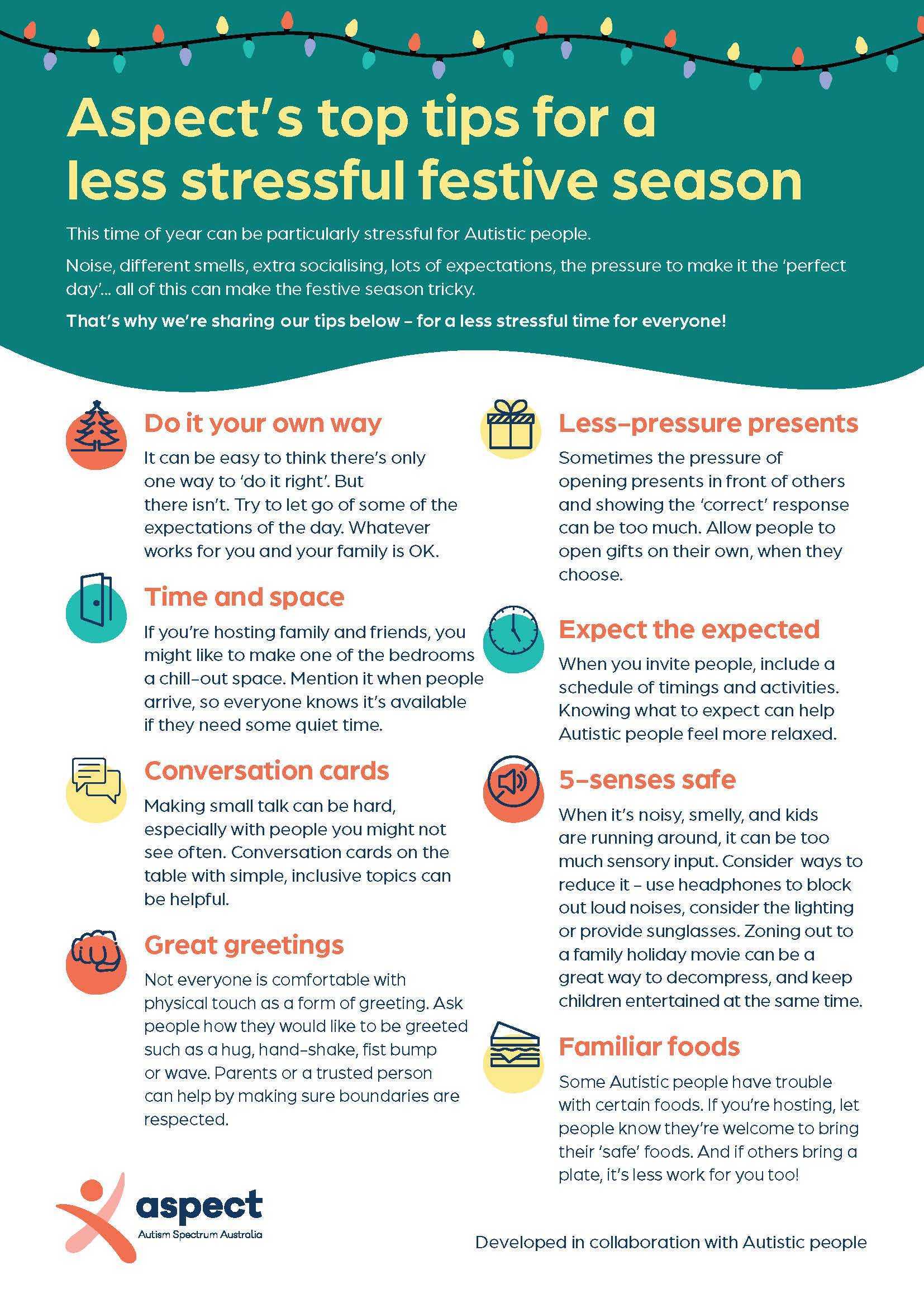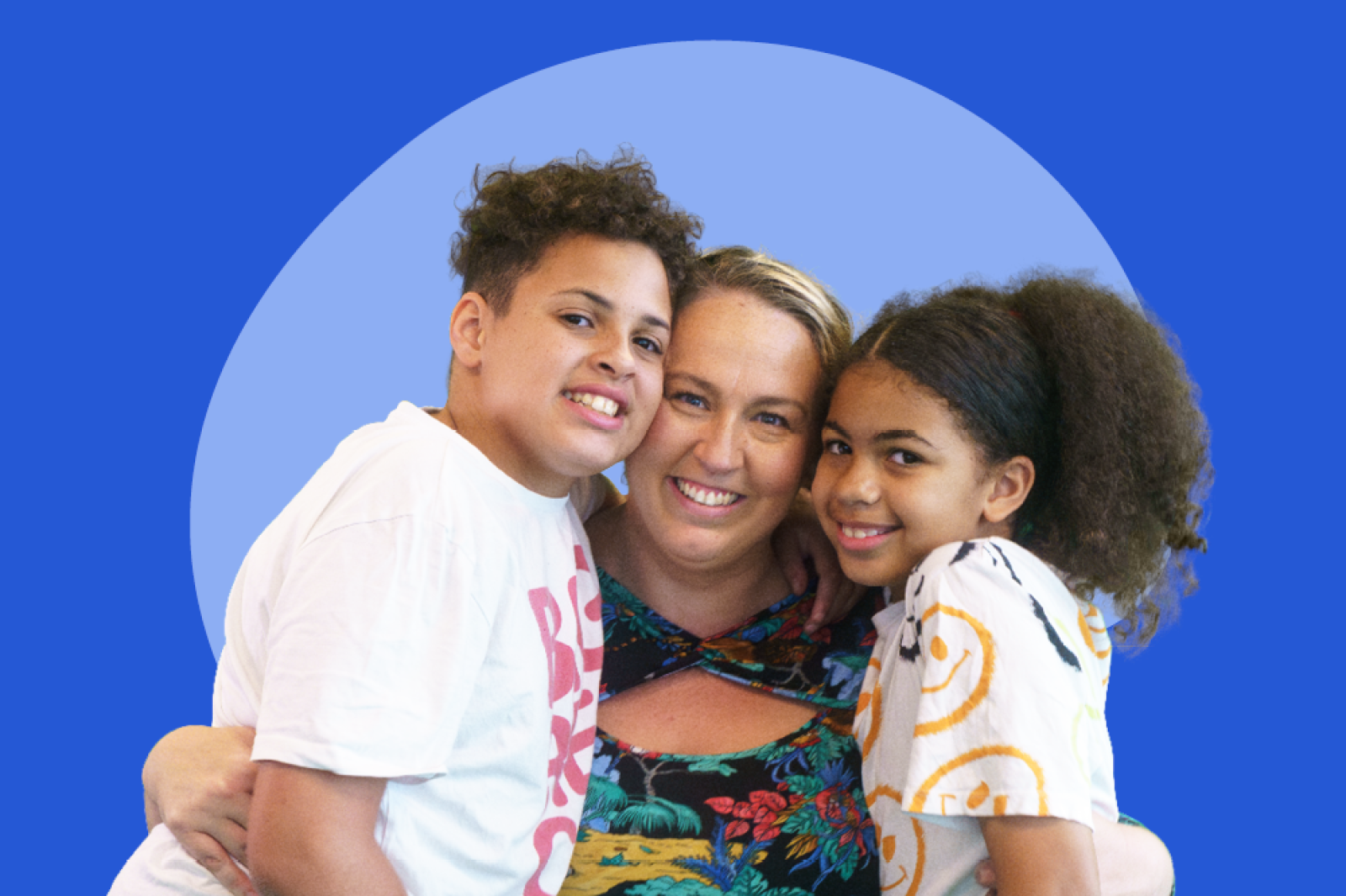Many people consider the holiday season as the most wonderful time of the year—a period filled with joyful celebrations, festive lights, and much-loved traditions. But for many Autistic individuals, Christmas can be an overwhelming and challenging time. Read Ainslie's blog below, and download Aspect's top tips for a less stressful festive season.
For families, friends, and communities, understanding these challenges is key to creating a more inclusive and enjoyable holiday experience for everyone. As a self-proclaimed Christmas grinch, I will outline why Christmas can be particularly difficult for some Autistic people, highlighting the factors that contribute to these struggles and offering practical tips to support them during the festive period.
Some of the challenges experienced by Autistic people in the lead up to Christmas include:
- Shopping centres and community spaces are exceptionally busy, crowded and noisy
- Additional social and energy demands, for example, feeling obligated to attend many different events and gatherings
- For Autistic adults, particularly parents, there are additional demands on executive functioning such as remembering when everything is, planning for presents, and events
- For church-going folks, there’s a level of expectation around behaving in a specific way at church
There are also specific challenges relating to attending Christmas day and Christmas events, which include:
- Not having access to safe or same foods
- Anxiety pertaining to opening presents and giving the reaction that the gift-giver is hoping for/expecting
- Social interactions and expectations with friends and distant family who you may only see once a year, specifically the expectation for greetings such as hugs for those who do not like physical touch (and sometimes people not respecting those boundaries)
- Noisy events and lack of space or permission to have down time to regulate
- Expectations around behaviour more generally
As mentioned, I am a Christmas Grinch, however I have two children who absolutely love the holiday season so I have extensive experience in creating strategies for, and modifying the season so it works for everyone in the family. Some strategies for reducing stress in the lead-up to Christmas that work for my family include:
- Not going to shopping centres past about the end of November
- Ordering anything and everything online including gifts and anything required for entertaining
- Autistic people may have very specific needs in terms of food e.g. neither of my children enjoy a typical Australian seafood Christmas lunch, nor do they enjoy more traditional Christmas food such as turkey, ham, and fruit cake, so we develop a menu together
- Starting planning really early in the year. Having children write Christmas lists in August and slowly chipping away at buying gifts and wrapping them as they come in, can greatly reduce stress in December
- Giving yourself permission to pick the events and traditions that are most important to the immediate members the family and not feeling obligated to do ‘everything’ (just because)
- Not feeling the need to celebrate Christmas in a traditional or specific way
- Taking the time to have breaks and practice self-care
I think the benefit of having a flexible approach to Christmas is that it can benefit a broad range of people. From speaking to many non-Autistic mothers, being stressed out by Christmas is not unique to just Autistic people. I am also not convinced that all people love all things that come with Christmas in a traditional sense. I think it’s really important to communicate and find a middle ground with your loved ones so that it works well for everyone.
So, if you are someone with sharing Christmas with family or friends who may be Autistic, what are some small adjustments that can you make your event a little more autism-friendly? Some suggestions include:
- Access to specific foods. Catering Christmas can be a lot of work so it may not be practicable to make specific dishes, so this can include either asking what they may like and creating that, or giving permission to bring their own food
- Advising people that it’s ok to open presents in private if they prefer
- Asking people what greeting they would prefer for example: handshake, hug, hi-five, wave and for people to genuinely be ok with what is chosen and not insisting on hugs
- Having options for activities that aren’t based around sitting and talking e.g. the option to watch a Christmas movie together
- Offering a designated break-out space where people can go to rest and regulate
Lastly, just remembering that Autistic people are individuals and have different personalities, preferences, and needs. Some of us will love Christmas and everything about it, whereas some will relate to some or all of the challenges outlined in this blog. The most important thing is to communicate with the loved ones in your life and create a celebration that works for everyone.

This blog was written by Ainslie Robinson. Ainslie is a proud Autistic mother living in the Sydney area; she is also the Working in Partnership Senior Officer at Aspect.





